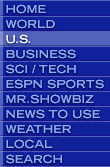
Could a 'White Southerner' Lead the U.S. in 1964?
Tapes Reveal LBJ's Self-Doubt
“I think people have a mistaken judgment. They think I want great power. What I want is great solace, a little love. That's all I want.”
— Lyndon Johnson, Summer 1964
LBJ on doubts about his ability to lead the nation 407 kb (wav) |
On not wanting "the power of the bomb" 305 kb (wav) |
On his lack of support in the South and the North 256 kb (wav) |
![]()
By Evan
Schuman
Special to ABCNEWS.com
As the
Democratic National Convention was about to convene in the summer of 1964,
Lyndon Johnson was so full of doubts about his ability to run the country
that he said even GOP nominee Barry Goldwater might make a better
president.
Newly released
tapes of phone conversations between the former president and associates
show that Johnson, at least briefly, did not think he could lead a country
bitterly divided over the burning issues of race and the U.S. military
presence in Vietnam.
In a conversation,
Johnson was told that if he decides to not seek re-election, he would be
making Goldwater the next president. "Well, that's all right. I don't
care," Johnson said. "I think he can do better than I
can."
"I have a desire to unite people," the
president went on, in one of many taped phone conversations released
Friday by Johnson's presidential library in Austin. "The South is against
me and the North is against me and the Negroes are against me and the
press doesn't really have any affection for me. I don't think a white
Southerner is the man to unite this nation in this
hour."
In the tapes-which dealt with Johnson
conversations from July 1 through Aug. 21, 1964-Johnson spoke passionately
about his not wanting to bear the weight of the presidency. "I don't want
this power of the bomb. I just don't want these decisions I am being
required to make. I don't want the conniving that is required," he said.
"I don't want the disloyalty that's around. I don't want the bundling and
the inefficiencies of our people. All of them talk too
much."
"There are just bound to be a lot of
people who don't have these doubts and these angers and these barnacles
and these things I have to carry. The nation ought to have the chance to
get the best (president) available," he said. "That's who I want my
children to have and I know I'm not."
Ultimately, it was a letter from Lady Bird Johnson that convinced him to
accept the nomination.
Many of Johnson's
concerns revolved around his inability to rally support from black
communities.
"I am very convinced that the
Negroes will not listen to me. They're not going to follow a white
Southerner and I think that the stakes are too big to try and compromise,"
he said, adding that he also doubted that he "could ever satisfy the
Northern Jews and Catholics and the union
people."
Other than the intensity of his
dislike of the presidency, little new information was revealed with the
release of these tapes, said Linda Hanson, a Johnson archivist.
Indeed, many of the released tapes were
illustrations of Johnson's legendary political skills. In one
conversation, for example, Johnson was speaking with an unidentified
member of Congress about his poverty bill and wanting to know whether
military action would help.
"What effect is
our asking Congress for a resolution to support us in Southeast Asia and
bombing the hell out of the Vietnamese tonight, " he said. "What effect
will that have on this bill? Will it kill it or help
it?"
Johnson even showed a rarely-seen, but
intense, need to be liked. "I think people have a mistaken judgment. They
think I want great power," he said. "What I want is great solace, a little
love. That's all I want."

